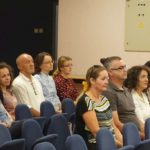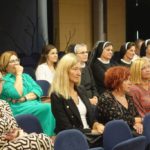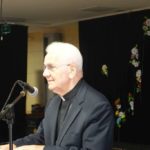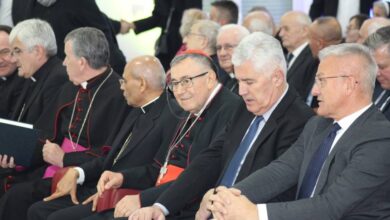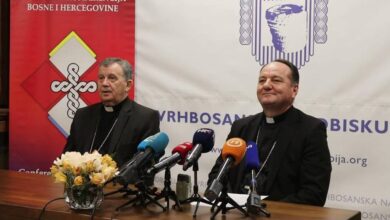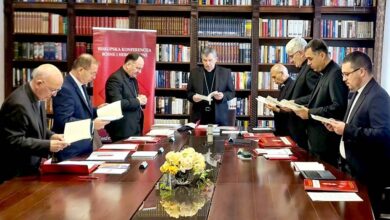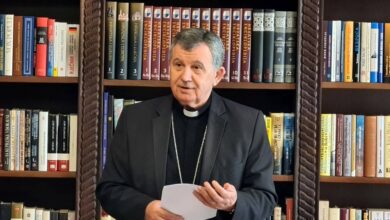CATECHETICAL DAY IN THE ATMOSPHERE OF 30 YEARS OF EVANGELIZATION IN SCHOOLS
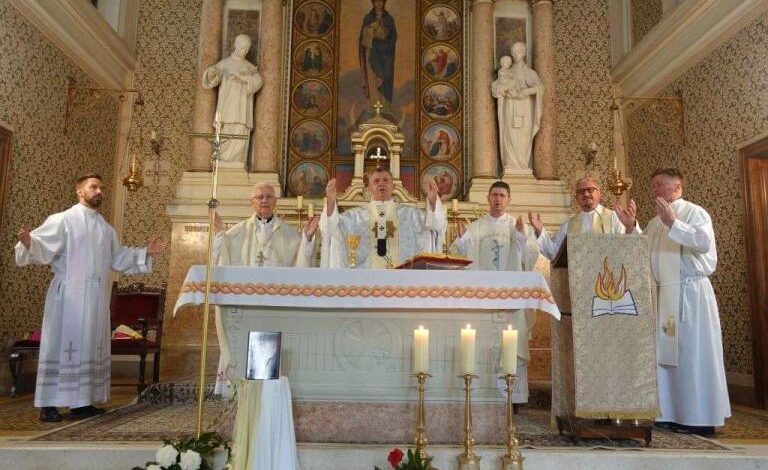
Let the testimony of faith be the content of the calling of religion teachers.
In the premises of the Catholic school centre Sv. Josip in Sarajevo on August 27th, a joint Catechetic Day was held for religion teachers who have a canonical mission in the area of the Vrhbosna Archdiocese and the Diocese of Banja Luka.
Catechetical Day, a regular annual seminar for Catholic religion teachers in primary and secondary schools from the area of the Vrhbosna Archdiocese (VN), was held for the 26th time in a row, and this year they were joined by colleagues from the Diocese of Banja Luka, so the joint gathering had more than 110 participants from both dioceses.
The meeting began with the singing of the song Krist na žalu, and then the director of the Catechetical Office of the BK BiH and the head of the Catechetical Office of the VN, rev. Tomislav Mlakić greeted those present, including the archbishop of Vrhbosna, Metropolitan Msgr. Tomo Vukšić and the Bishop of Banja Luka, Msgr. Franjo Komarica, and presented the program.
Returning priests to the education system
The first presentation was given by the head of the Catechetic Office of the Banja Luka Diocese, rev. Marko Vidović. First, he briefly explained the historical circumstances of the introduction of religious education in schools in Bosnia and Herzegovina, and then spoke about the statistics concerning present time. He informed that with the return of religious education to schools, work on textbooks, methodology, personnel training and status regulation at different levels of government was started.
He then spoke about the factual situation in the Diocese of Banja Luka, noting that there are 38 religion teachers working in that diocese: 14 priests and seven nuns and 17 lay people, who work in 40 primary and 23 secondary schools. He said that 1 994 students attend primary school religious education, and 1 097 attend secondary school. He underlined that in the RS there are 139 students in primary school and 39 students studying religious education in 13 secondary schools, pointing out that eight religion teachers work in as many as 42 schools with a total of 188 students. He called the Catholic schoolchildren attending religious education, not the only ones in the class, but the only ones in the entire school, true witnesses.
In the end, he recalled how the problem was solved 30 years ago by the entry of priests into schools, who were withdrawn as educated lay people arrived, and he underlined how, it seems, a similar time is coming when presbyters will have to “return” to schools…
Activities of the Catechetic Office of the VN
Rev. Mlakić presented on the same topic, but from the perspective of the Archdiocese of Vrhbosna. He cited data that there are 117 religion teachers in VN, and Catholic religious education is taught in 77 primary and 56 secondary schools attended by 8 682 primary and 4 231 religion students in secondary schools. He pointed out that the number of students has been statistically monitored since 2015 and that it is decreasing. Most numerous religion class students are in in Central Bosnia County – 6 226, and the least in Tuzla county, where there are 412. Speaking of the Brčko District, he said that there are many schools there, as many as 14, and that 410 students attend religious education.
He further spoke about the regular activities of the Catechetical Office of the VN, which, among other things, are reflected in the organization of the Catechetical School, spiritual renewal and the Religious Olympics. He particularly emphasized regular communication with ministries and schools and monitoring of legal regulations related to religion education. He emphasized that priests are less ready to work in schools and underlined that the number of lay people studying theology is decreasing.
He ended his presentation with a call for increased cooperation between religion teachers and parish priests and “cooperation” between parish catechesis and school religious education.
Thirty years in the service of evangelization
The special lecture entitled 30 years in the service of evangelization was then given by Msgr. Komarica who reminded of the beginning of the introduction of religious education in schools. He informed that in the document Gravissimum educationis – on Christian education, the Second Vatican Council adopted “basic principles on Christian education, especially in schools”” “After a kind of ‘ice age’ that lasted 45 years in the territory of many Eastern European countries, in the early 90’s of the 20th century we experienced the beginning of democratic changes (…) In this context, I remind you that we, the bishops – members of the then BKJ – already in the summer of 1990 (July 10th) addressed the entire domestic public with the Announcement on Church Life in New Circumstances”, said Msgr. Komarica and noted that they carefully discussed the issue of religious textbooks and personnel who would teach religious education.
“In accordance with the decision of the BKJ, on July 5th, 1991, we, the bishops of the Vrhbosna Metropolis, sent a request to the Ministry of Education of Bosnia and Herzegovina to introduce religious education as an optional subject in primary and secondary schools”, he added, noting that they also sent instructions to priests of the Vrhbosna metropolis, among which is the ban on teaching religious studies by unqualified lay people.
“In 1992, due to the urgent need to train qualified staff for the profession of teacher and professor of religion studies, we in our Vrhbosna metropolis (Sarajevo, Mostar, Banja Luka) had about 300 students – lay believers, who were enrolled in one of the Catholic universities, preparing for this responsible service”, the bishop reminded and then spoke about school religious education in the service of evangelization in the context of the post-synodal exhortation Catechesi tradendae by St. John Paul II. from 1979 on the subject of catechesis in the modern world.
“From the very beginning of religious training in schools, we bishops knew very well how important it is to pay attention to the qualified training of religion teachers. Church law stipulates and therefore necessarily requires a mandate (mission) given to each religious teacher by the Ordinary”, he said, and at the end he addressed the religion teachers emphasizing how the testimony of personal faith should also become the content of their vocation. He underlined that faith requires, in addition to knowledge, also living. In the end, he thanked all religion teachers for bringing Christ closer to young people.
In the short break that followed, those present had the opportunity for separate meetings of religious teachers from the Archdiocese of Vrhbosna and the Diocese of Banja Luka.
Religious education must lead to the Eucharist
Then in the church of The Queen of the Holy Rosary, which is part of the KŠC, followed an examination of conscience led by Msgr. Komarica, and those present could access the confession.
The Eucharist was led by Msgr. Vukšić in the fellowship with Bishop Franjo and the concelebration of a dozen priests, among whom was the Vicar General of the VN Msgr. Slađan Ćosić.
In the appropriate sermon, the Archbishop spoke about the Holy Mass readings, that is, the passage from Matthew’s Gospel about the distribution of talents. Addressing the religion teachers directly, he emphasized the importance of Christ’s message in preaching God’s word and witnessing, as well as the use of talents. “To some the Lord gave less, and to some more talents, but to each according to his ability”, said Archbishop Vukšić and emphasized that everyone received as much as he was capable of performing. He also said that the story of the talents is a permanent lesson for all Christians, pointing out that talents should be constantly nurtured and multiplied, and on the trail of that, he underlined that “God wants to continue building the world through us”. He ended the sermon with the words that “Christianity is action and constant initiative”.
At the end of the Holy Mass, the canonical messages were distributed, and the meeting ended with a joint photo session and a snack in the KŠC premises.
Although during the Catechetical Day certain devastating statistics were presented, which the religious teachers cannot influence, it is clear that they, among other things, live their faith by example, and so many, after a thorough examination of conscience, approached the sacrament of confession and they, spiritually strengthened, started the new school year.
KT
Sarajevo – August 27, 2022
















































